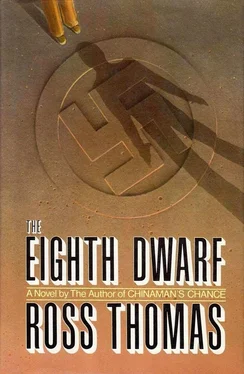But it wasn’t just the man’s habitual tardiness that infuriated him. Everything about Baker-Bates was wrong, Colonel Whitlock felt. Wrong accent, wrong clothes, wrong school, and yes, damn it, wrong class. He knew about Baker-Bates’s record during the war and had to admit that it was good, perhaps even brilliant in spots. But lots of chaps had had brilliant records — even chaps like Baker-Bates who didn’t really quite fit. But when the war was over, they’d had the good sense to say Thank you very much and go back to where they belonged.
Colonel Whitlock wondered what it really was about Baker-Bates that grated so much. Was it the man’s condescension, which almost bordered on mute insolence? Or was it his quick and restless mind, which flitted about hither and yon, racing on ahead of its rivals and then waiting impatiently for them to catch up, the boredom plainly evident on its owner’s face?
The fellow’s clever, no doubt about it, the Colonel admitted, and because he prided himself on being a realist and, at any rate, put no real premium on cleverness, he went on to admit that Baker-Bates probably was cleverer than he himself. But that didn’t account for it — not for the fellow’s rapid, almost spectacular rise in the secret-intelligence business. Not in rank, to be sure, although they’d probably jump him to colonel before long. That was in the wind. You could almost smell it. The fellow almost swung that much power now as a mere major. Might as well give him the rank to go with it. It was Baker-Bates’s wife, of course. An ugly little woman. The Colonel had seen pictures of her in the British press. Not because she was Mrs. Gilbert Baker-Bates, though. Scarcely that. But because she was a minister’s daughter. Married her during the war. Nobody had thought then that the Socialists would win. Probably one himself, Colonel Whitlock concluded with grim satisfaction.
The telephone on his desk rang. It was Sergeant Lewis.
“Major Baker-Bates is here, sir.”
“Well, send him in; send him in,” the Colonel said grumpily.
“Good morning, sir,” Baker-Bates said as he came in and took a chair before the Colonel’s desk.
“You’re late.”
Baker-Bates shrugged. “Sorry. The rain, you know.”
“Well, he left this morning, just as that woman said he would.”
“But not for Berlin.”
“No. He caught the Hamburg train. We put that chap of yours onto him.”
“Bodden’ll lose him,” Baker-Bates said. “Probably in Hamburg.”
To hide his irritation, the Colonel lit a cigarette, his tenth of the morning. The man’s insufferable, he thought; then he blew some smoke out and said, “What makes you so sure?”
“That Bodden’ll lose him?”
“Mmm.”
“He has to.”
“You feel he’s that good?”
“Our Russian friends wouldn’t have sent him unless he were.”
“Well, he hasn’t had all that much experience, has he? As I recall, he spent four years in a camp. Belsen, wasn’t it?”
“You can learn a lot in a camp. He did. They picked them out in the camps, you know, the ones that they would use later. They got the cushy jobs. From what I’ve been able to find out, he was one of the star pupils. After he got out, they sent him back to Moscow. They had a year to train him there. More than a year.”
“After Hamburg. You think he’ll head for Frankfurt after Hamburg?”
“I’m certain of it.”
“You’ll be on hand there, of course.”
“Yes.”
“And you still think he might lead you to him — to this Oppenheimer person?”
“He might.”
“What about the Americans?”
“What about them... sir?”
The sir had been tacked on at the end, almost thoughtlessly, and it irritated the Colonel. He mashed his half-smoked cigarette out in the tray, doing it carefully, taking his time, trying to keep his anger from becoming obvious.
“What about them?” he snapped in spite of himself. “Well, they just might feel that you were poaching.”
Baker-Bates shrugged. “If their feathers get ruffled, I think I know how to smooth them down. I’ve dealt with them often enough before, you know.”
The man’s insufferable, the Colonel thought for perhaps the fifth time that morning. But he kept his tone low and casual, almost indifferent. “To be sure. But what if this chap Bodden doesn’t lead to Oppenheimer? What then?”
“Then we might have to turn to someone else who’s waiting in the wings.”
“Who?”
Baker-Bates smiled for the first time that morning. It was his usual gray smile; and it made its appearance in anticipation of the Colonel’s reaction. “Well, sir, we might have to use the dwarf.”
“Dwarf?” the Colonel said, spluttering the word in spite of his resolve not to. “Did you say a dwarf?”
“Yes, sir,” Baker-Bates said, still smiling, “the dwarf.”
Robert Henry Orr, the man whom the OSS had called Nanny, seldom got out to the Pentagon because he didn’t like the smell of burning ambition, which, he had decided long ago, had an odor all its own.
Ambition, he thought, reeked of sweat; not the jockstrap kind, or that which came from honest toil, but the sweetish-sour kind that is the product of fear, bad nerves, poor digestion, and too much Mum. Orr prided himself on his sensitive nose, and he was sure he could detect a strong trace of ambition’s pungent smell in the office of the man whom he was now waiting to see.
The office was in either the second or the third ring of the Pentagon. Orr wasn’t sure because, despite his many other qualities, he had absolutely no sense of direction. North, south, east, and west remained complete mysteries to him. He knew left from right, but because he was almost ambidextrous, he always had to pause and think about it. He had, of course, become lost in the Pentagon. He always did. Pride, however, had kept him from asking directions, and he had wandered aimlessly about, sniffing the ambition, until luck had guided him to where he wished to go.
Orr was waiting for Milo Stracey, who, Orr felt, was the coldest man he had ever known. Stracey came from somewhere in Idaho, up near the Canadian line, and Orr was almost sure that he had been machined, not born. There were no rough edges on Stracey, none, and Orr was convinced that there never had been.
“If you opened him up,” somebody had once said to Orr, “you know what you’d find? Dry ice, that’s what.”
Stracey’s qualities had been quickly sized up by the man who had run the OSS, Wild Bill Donovan, nick-named by his World War I troops after some obscure baseball player. Donovan had been about as wild as a bridge shark with the rent due. He also had had the coldest blue eyes that Orr had ever seen until the day he met Milo Stracey. Stracey’s were colder, far colder. And it was because of Stracey’s well-iced emotions that Donovan had put him in charge of the Swill.
The Swill had been those occasional OSS missions doomed to failure, but nevertheless dispatched because their failure was part and parcel of some desperate ploy dreamed up by the dreamers in the building at 25th and E, Northwest. Milo Stracey had been the dispatcher; obviously enjoyed his assignment, if ever he enjoyed anything; and consequently had risen quickly in the OSS power structure. He had been much feared, much hated, much avoided, and totally despised by all but Congress, who regarded him as a take-charge, no-nonsense kind of guy who, if but given half a chance, could have straightened out all those OSS pinkos that Donovan had assembled.
Stracey strode into his office, glanced at Orr, sat down at his desk, and by way of greeting, said, “What do you want?”
Orr smiled his most benign smile. “I had a little cold, but I’m almost over it now, thank you.” He took Minor Jackson’s passport out of his breast pocket and tossed it onto Stracey’s desk. “Remember him?”
Читать дальше












